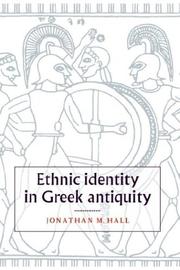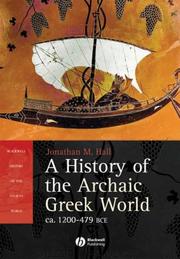| Listing 1 - 6 of 6 |
Sort by
|

ISBN: 0226313298 9780226313290 Year: 2002 Publisher: Chicago (Ill.): University of Chicago press
Abstract | Keywords | Export | Availability | Bookmark
 Loading...
Loading...Choose an application
- Reference Manager
- EndNote
- RefWorks (Direct export to RefWorks)
In today's cosmopolitan world, ethnic and national identity has assumed an ever-increasing importance. But how is this identity formed, and how does it change over time? With Hellenicity, Jonathan M. Hall explores these questions in the context of ancient Greece, drawing on an exceptionally wide range of evidence to determine when, how, why, and to what extent the Greeks conceived themselves as a single people. Hall argues that a subjective sense of Hellenic identity emerged in Greece much later than is normally assumed. For instance, he shows that the four main ethnic subcategories of the ancient Greeks--Akhaians, Ionians, Aiolians, and Dorians--were not primordial survivals from a premigratory period, but emerged in precise historical circumstances during the eighth and seventh centuries B.C. Furthermore, Hall demonstrates that the terms of defining Hellenic identity shifted from ethnic to broader cultural criteria during the course of the fifth century B.C., chiefly due to the influence of Athens, whose citizens formulated a new Athenoconcentric conception of "Greekness."
Hellenism --- Greeks --- Hellénisme --- Grecs --- Ethnic identity --- Identité ethnique --- Greece --- Grèce --- History --- Civilization --- Histoire --- Civilisation --- Greeks - Ethnic identity - History - To 1500 --- Greece - History - To 146 B.C. --- Ethnology --- Mediterranean race

ISBN: 052158017X 9780521789998 9780521580175 9780511605642 0521789990 0511090455 0511605641 0511005318 9780511005312 Year: 1997 Publisher: Cambridge New York, NY : Cambridge University Press,
Abstract | Keywords | Export | Availability | Bookmark
 Loading...
Loading...Choose an application
- Reference Manager
- EndNote
- RefWorks (Direct export to RefWorks)
In this book Jonathan Hall seeks to demonstrate that the ethnic groups of ancient Greece, like many ethnic groups throughout the world today, were not ultimately racial, linguistic, religious or cultural groups, but social groups whose 'origins' in extraneous territories were just as often imagined as they were real. Adopting an explicitly anthropological point of view, he examines the evidence of literature, archaeology and linguistics to elucidate the nature of ethnic identity in ancient Greece. Rather than treating Greek ethnic groups as 'natural' or 'essential' - let alone 'racial' - entities, he emphasises the active, constructive and dynamic role of ethnography, genealogy, material culture and language in shaping ethnic consciousness. An introductory chapter outlines the history of the study of ethnicity in Greek antiquity.
Minorities --- Ethnic identity. --- Ethnicity --- Minorités --- Ethnicité --- History --- Histoire --- Greece --- Grèce --- Ethnic relations. --- Civilization --- Relations interethniques --- Civilisation --- Ethnic minorities --- Foreign population --- Minority groups --- Persons --- Assimilation (Sociology) --- Discrimination --- Ethnic relations --- Majorities --- Plebiscite --- Race relations --- Segregation --- Ethnic identity --- al-Yūnān --- Ancient Greece --- Ellada --- Ellas --- Ellēnikē Dēmokratia --- Elliniki Dimokratia --- Grčija --- Grecia --- Gret︠s︡ii︠a︡ --- Griechenland --- Hellada --- Hellas --- Hellenic Republic --- Hellēnikē Dēmokratia --- Kingdom of Greece --- République hellénique --- Royaume de Grèce --- Vasileion tēs Hellados --- Xila --- Yaṿan --- Yūnān --- Ελληνική Δημοκρατία --- Ελλάς --- Ελλάδα --- Греция --- اليونان --- يونان --- 希腊 --- Arts and Humanities --- 39 --- 938

ISBN: 9780631226680 9780631226673 0631226672 0631226680 Year: 2007 Publisher: Malden, Mass. ; Oxford, UK Blackwell Publishing
Abstract | Keywords | Export | Availability | Bookmark
 Loading...
Loading...Choose an application
- Reference Manager
- EndNote
- RefWorks (Direct export to RefWorks)
Greece --- Grèce --- History --- Histoire --- Greece - History - To 146 B.C.
Book
ISBN: 150176053X 150176103X 9781501761034 9781501760532 9781501761027 1501761021 Year: 2021 Publisher: Ithaca [New York]
Abstract | Keywords | Export | Availability | Bookmark
 Loading...
Loading...Choose an application
- Reference Manager
- EndNote
- RefWorks (Direct export to RefWorks)
This volume examines the post-antique history of Argos and how the city's archaeological remains have been perceived and experienced since the late eighteenth century by both local residents and foreign visitors to the Greek Peloponnese.
Historic sites --- Cultural property --- Argos (Greece) --- Antiquities.
Book
ISBN: 9780226096988 9780226313382 0226313387 022609698X Year: 2014 Publisher: Chicago ; London University of Chicago Press
Abstract | Keywords | Export | Availability | Bookmark
 Loading...
Loading...Choose an application
- Reference Manager
- EndNote
- RefWorks (Direct export to RefWorks)
Archaeology and history --- Christian antiquities. --- Church history --- Archéologie et histoire --- Antiquités chrétiennes --- Eglise --- Histoire --- Greece --- Rome --- Grèce --- Antiquities. --- Historiography. --- Antiquités --- Historiographie --- Archéologie et histoire --- Antiquités chrétiennes --- Grèce --- Antiquités
Book
ISBN: 9780226819044 0226819043 Year: 2022 Publisher: Chicago ; London : The University of Chicago Press,
Abstract | Keywords | Export | Availability | Bookmark
 Loading...
Loading...Choose an application
- Reference Manager
- EndNote
- RefWorks (Direct export to RefWorks)
"The early first millennium BCE marks one of the most culturally diverse periods in the history of the eastern Mediterranean. Surveying the region from Greece to Iraq, one finds a host of cultures and political formations, all distinct, yet all visibly connected in meaningful ways. These include the early polities of Geometric period Greece, the Phrygian kingdom of central Anatolia, the Syro-Anatolian city-states, the seafaring Phoenicians and the Biblical Israelites of the southern Levant, the Urartian kingdom of the eastern Anatolian highlands, and the expansionary Neo-Assyrian Empire of northern Mesopotamia. This volume explicitly adopts an interdisciplinary approach to understanding the social and political significance of how interregional networks operated within and between Mediterranean cultures during that era"--
Iron age --- Middle East --- History --- Ethnic relations --- Commerce --- Antiquities
| Listing 1 - 6 of 6 |
Sort by
|

 Search
Search Feedback
Feedback About
About Help
Help News
News